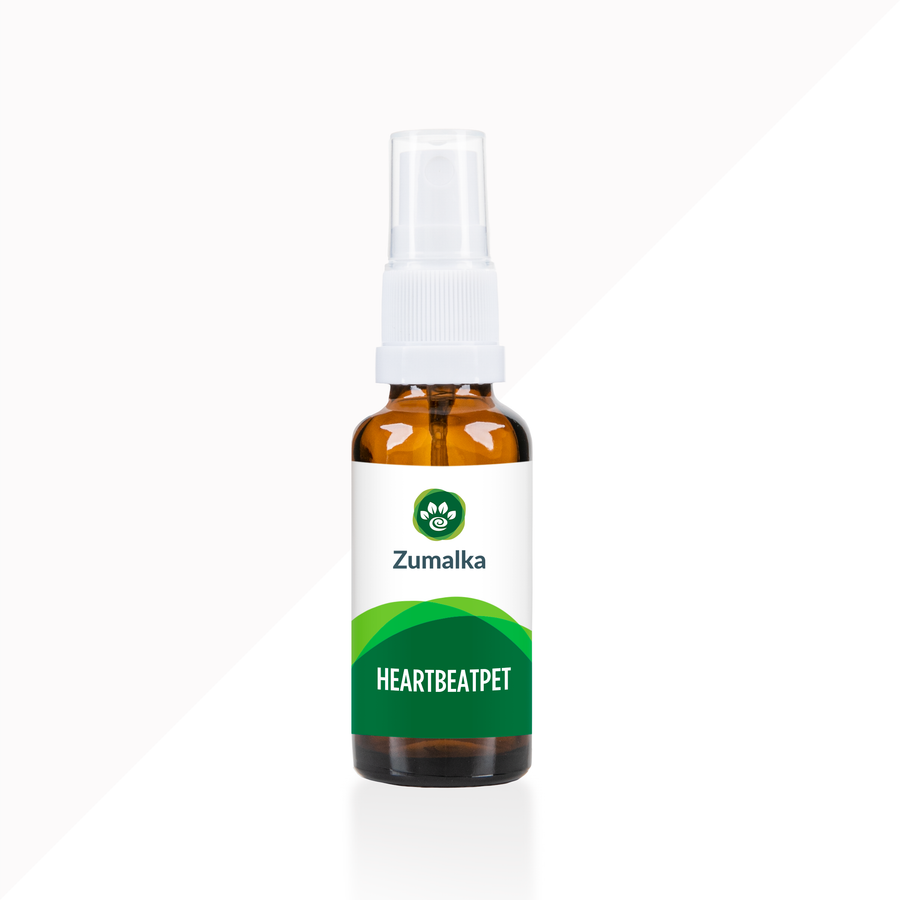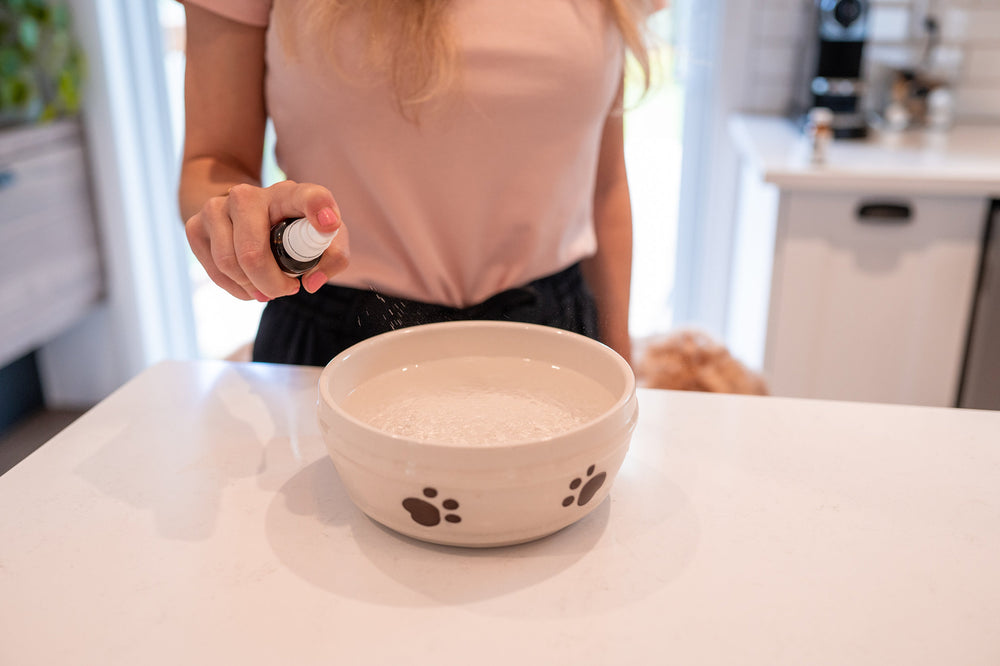Vet-Recommended: Holistic Support for Dogs with Arrhythmia
List of Contents
- Recognizing Dog Arrhythmia Symptoms at Home
- Monitoring Dog Arrhythmia at Home: What to Watch For and When to Call the Vet
- Understanding At-Home Diagnostic Support for Dogs with Veterinary Oversight
- Preventing the Underlying Causes of Arrhythmia Through General Wellness
- Enhance Your Dog’s Heart Health with Trusted Natural Remedies
- Key Takeaways
- FAQs
Canine arrhythmia is an irregular heart rhythm that may impact your dog’s heartbeat speed, strength, or pattern. Early awareness helps ensure timely care and better heart health outcomes.
Arrhythmias in dogs are typically caused by abnormal electrical activity in the heart. They may be congenital (present at birth) or develop later due to underlying health conditions. Canine arrhythmias are relatively common and can range from mild to life-threatening.
A veterinarian is essential for diagnosing the condition and determining the appropriate treatment. In addition, consulting a qualified pet homeopathy expert may offer complementary support for your dog’s heart health.
Recognizing Dog Arrhythmia Symptoms at Home

Recognizing the signs of arrhythmia in dogs is essential for early intervention and effective treatment. Timely action can greatly improve your dog’s heart health and quality of life.
- Exercise intolerance: Your dog may tire quickly, struggle with walks, or show reluctance to play due to reduced heart efficiency.
- Irregular heartbeat: You may feel skipped beats or uneven rhythms when placing your hand on your dog’s chest.
- Fainting, collapse, or loss of consciousness: Sudden blackouts may occur, especially after exertion or excitement, due to disrupted blood flow to the brain.
- Weakness: Dogs with arrhythmia may seem physically unstable, especially in their hind legs, or struggle to stand for long periods.
- Lethargy or excessive sleeping: Increased resting or disinterest in normal activities can signal poor circulation or oxygen delivery.
- Panting or labored breathing: Your dog may breathe heavily, even at rest, due to the heart’s inability to properly oxygenate the body.
- Long pauses between heartbeats: These noticeable gaps in rhythm may be detectable during veterinary exams or at-home monitoring.
Arrhythmia can exacerbate existing heart disease, potentially leading to fluid buildup in the abdomen. This accumulation, caused by reduced heart function, may result in noticeable bloating or discomfort in the belly area.
Additional signs that develop as a result of worsening heart function or complications, such as congestive heart failure, which accompany arrhythmia, may include pale gums, cold or bluish extremities, a weak pulse, coughing, or reduced appetite. In severe cases, arrhythmia can lead to sudden collapse or even sudden death.
Monitoring Dog Arrhythmia at Home: What to Watch For and When to Call the Vet

To check your dog’s heartbeat at home, gently place your hand on their chest just behind the left front leg, or use a stethoscope for more accurate results. This simple method helps monitor your dog’s heart rate and detect early signs of potential health issues.
To get the beats per minute, count your dog's heartbeats for 15 seconds, then multiply the result by 4. The size and age of your dog will determine its normal heart rate. Frequent heart rate assessments can aid in the early detection of cardiac illness or arrhythmias.
Early detection of arrhythmia begins with attentive pet parents. If your dog shows signs of an irregular heartbeat or other concerning symptoms, contact your veterinarian right away. Consider consulting a qualified pet homeopath for additional, holistic support.
Always inform your veterinarian of any unusual symptoms you observe at home. Early diagnosis and treatment are key to preventing complications and supporting your dog’s long-term heart health.
Understanding At-Home Diagnostic Support for Dogs with Veterinary Oversight

Holter monitoring involves your dog wearing a vest-like device at home for 24 to 48 hours to record heart activity during normal routines. This non-invasive tool helps veterinarians evaluate the frequency and severity of arrhythmias for more accurate diagnosis and treatment planning.
Pet owners can learn to use a stethoscope at home to monitor their dog’s heart rate between vet visits. While this method supports early detection, in-clinic exams and ECGs remain essential for a complete cardiac assessment.
Managing canine arrhythmia often involves ongoing monitoring and long-term medication. Consistent care is key to maintaining your dog’s heart health and overall quality of life.
Preventing the Underlying Causes of Arrhythmia Through General Wellness
Routine veterinary care plays a key role in identifying heart conditions or underlying health issues before they progress to arrhythmia. Early detection through regular check-ups supports proactive treatment and long-term cardiac health.
Moreover, consulting a pet homeopathy specialist can offer valuable insight into natural, holistic approaches to supporting your dog’s heart health. These gentle, complementary therapies may enhance overall wellness alongside conventional veterinary care.
Protecting your dog from toxins to prevent heart issues
Preventing toxin exposure is an important step in protecting your dog’s heart health. Safely storing household chemicals, medications, and certain foods can reduce the risk of arrhythmia caused by accidental ingestion.
Heartworm prevention is crucial for protecting your dog’s heart
Monthly heartworm prevention is essential for protecting your dog from heartworm disease, a serious condition that can lead to arrhythmias. Consistent prevention supports long-term heart health and overall well-being.
The link between underlying conditions and arrhythmias in dogs
Underlying conditions like hypothyroidism can contribute to the development of arrhythmias in dogs. A thorough veterinary evaluation helps detect and treat these contributing factors to better support your dog’s heart health.
Enhance Your Dog’s Heart Health with Trusted Natural Remedies
Conventional treatment for canine arrhythmia typically involves medical interventions prescribed by a veterinarian. Most evidence-based options include prescription medications tailored to manage heart rhythm and support overall cardiac function.
Veterinary treatment for arrhythmia may include medications such as diltiazem, amlodipine, sotalol, or mexiletine, as well as antibiotics or anti-inflammatories when appropriate. In more advanced cases, options like pacemaker implantation, cardioversion, or radiofrequency ablation may be recommended.
Explore safe, natural ways to boost your dog’s heart health
Natural options are available to help support your dog’s heart health alongside conventional care. These gentle, holistic remedies can promote cardiovascular function, improve circulation, and enhance overall wellness.
The HEARTBEATPET OPTIMAL KIT is a gentle, natural option that may help support your dog’s overall cardiovascular wellness.
This combination of homeopathic remedies and natural ingredients is traditionally used to help maintain healthy circulation, energy levels, heart rhythm, and vitality. It is suitable for pets in need of general heart and vascular system support.
This kit includes HEARTBEATPET along with TONICPET #1, TONICPET #2, TONICPET #4, TONICPET #6, and TONICPET #8, each selected to support your dog’s heart and overall wellness.
Key Takeaways
Effectively managing arrhythmia in dogs requires a proper veterinary diagnosis and ongoing medical supervision. Partnering with your veterinarian ensures the safest, most effective treatment plan to support your dog’s long-term heart health.
While vigilant at-home monitoring and adherence to veterinary instructions are important, successful arrhythmia treatment is grounded in expert diagnosis and prescribed medical care.
For those seeking a more holistic approach, consulting a qualified pet homeopathy specialist can provide gentle, natural support that complements conventional care and nurtures your dog’s overall heart wellness.
FAQs
How long can a dog live with an arrhythmia?
A dog with arrhythmia can live for months to years, depending on the type, severity, and treatment plan. With proper veterinary care and ongoing monitoring, many dogs enjoy a good quality of life.
How do you treat arrhythmias in dogs?
Treating arrhythmias in dogs typically involves prescription medications, lifestyle adjustments, and regular veterinary or pet homeopathy monitoring. In some cases, procedures like pacemaker implantation or cardioversion may be recommended to manage severe or persistent cases.
What does arrhythmia look like in a dog?
Arrhythmia in dogs may appear as fainting, weakness, lethargy, exercise intolerance, or an irregular heartbeat. Some dogs may also show labored breathing, coughing, or collapse, prompting the need for immediate veterinary evaluation.
What are the warning signs of arrhythmia in dogs?
Warning signs of arrhythmia in dogs include irregular heartbeat, fainting, weakness, lethargy, exercise intolerance, coughing, and labored breathing. Early recognition and prompt veterinary care are essential for effective treatment and management.
Should I be worried if my dog's heart is beating fast?
A fast heartbeat in dogs can signal stress or excitement. If your dog’s heart rate stays elevated or is paired with other symptoms like arrhythmia, consult your veterinarian promptly.
Can dehydration cause arrhythmia in dogs?
Yes, dehydration can lead to arrhythmia in dogs by affecting electrolyte levels and disrupting normal heart rhythm. Keeping your dog well-hydrated is essential for supporting healthy heart function and overall wellness.
How can I check my dog’s heart?
You can check your dog’s heart by feeling their chest or using a stethoscope to monitor heartbeat and rhythm. Count beats per minute and note irregularities. Consult your veterinarian, and consider added guidance from a qualified pet homeopathy specialist.
Can stress cause arrhythmia in dogs?
Yes, stress can contribute to arrhythmia in dogs by triggering hormonal and nervous system responses that affect heart rhythm. Managing stress through a calm environment and regular vet care supports better heart health and overall well-being.
Can a lack of water cause arrhythmia in dogs?
Yes, lack of water can cause arrhythmia by leading to dehydration and electrolyte imbalances. Proper hydration is essential for maintaining normal heart rhythm and supporting your dog’s overall cardiovascular health and function.









Leave a comment